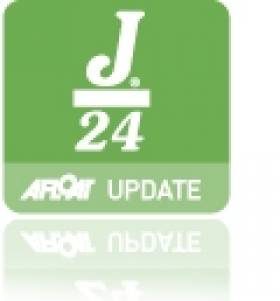Displaying items by tag: BMW J24 European Championship
Countback needed to decide J24 Western Championship
O'Driscoll, the Corkman who sails out of the Royal St.George but is racing in Howth this season in preparation for the forthcoming BMW European Championships there in September, got off to the perfect start by winning the first race but was black-flagged in the second, when victory went to local boat 'Jeb' (Andrew Mannion) ahead of 'Jibberish'.
Heavy squalls in race 3 mixed things up again with Stefan Hyde/Declan MacManus's 'Kilcullen' taking the gun from local man Stan Bradbury in 'Javelin'. The fourth race was sailed in Force 5+ winds and with most boats opting for jibs, it was 'Jeb' who took the honours and so lead overnight.
On the second day, Mickey McCaldin's 'Murder Picture' from Lough Erne won race 5 from 'Jibberish', a result that meant any of the top six could win the event going into the final race. O'Driscoll and crew held their nerve to beat O'Kelly et al to the line, leaving the two tied on points after the discard.
On countback, two race wins was enough to give the edge to 'Hard on Port' and 'Jeb' finishing third. Three points separated the top five points, illustrating the closeness of competition in this one-design keelboat class.
J24 Western Championships at Lough Ree YC - Results:
Hard on Port Flor O'Driscoll (RStGYC/HYC) 14ptsJibberish Fergus O'Kelly et al (HYC) 14 ptsJeb Andrew Mannion (LRYC) 16 ptsJavelin Stan Bradbury (LRYC) 16 ptsKilcullen Hyde/MacManus (RCYC/HYC) 17 pts





























































